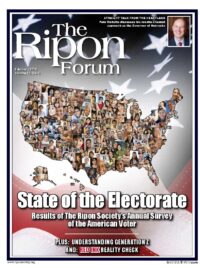
Though you wouldn’t know it from the recent budget choices that are adding to the debt at an unprecedented clip, the state of our fiscal union is terrible. Downright dismal. And alarmingly so. Both because the situation is so bad, and made even worse by the fact that politicians no longer seem to care.
The national debt – standing at an eye-popping $14.8 trillion (or $20.5 trillion if you count what we owe to ourselves and the trust funds we have borrowed from) – has grown by more than $400 billion since the day Trump entered office (which is not necessarily the best indicator, but one he introduced into the conversation when he tweeted after a month in office how much the debt had gone down.)
Relative to the economy, the debt stands at 77%, the highest it’s been since just after World War II. Interest owed on the debt amounts to well over $2,000 for every U.S. household on an annual basis.
But what is worse than where we are, is where we are headed. The debt is likely to grow by over $12 trillion over the next 10 years, likely eclipsing 100% of GDP. We expect annual trillion dollar deficits to return in the next year or so, which should be a heck of a wake-up call given that we are in an expanding economy, not a massive recession.
The debt is likely to grow by over $12 trillion over the next 10 years, likely eclipsing 100% of GDP.
And yet, politicians don’t seem to be waking up. Last year’s tax cut fell wildly short of what real tax reform could and should have achieved. Reform should have been structured to grow the economy, enhance our competitiveness, and simplify the tax code. This is achieved by lowering tax rates and broadening the tax base — or getting rid of many of the over $1.5 trillion in annual tax breaks that littered the tax code.
Instead, we took the political coward’s way out and lowered rates but left the vast bulk of tax breaks in place. The $1 to $2 trillion price tag vastly worsened our already bad fiscal situation. This in turn undermined the growth effects of the bill, because while the tax cuts will help growth, the higher debt harms it. At a time where we desperately need pro-growth policies to help counter the headwind of demographics, this was a huge squandered opportunity. What we got was a short-term sugar high and a trillion dollar plus bill for our kids.
But more than that, the tax cuts appear to have left Congress giving up on fiscal responsibility entirely. The budget deal (coming a third of the way through the year) demonstrates the worst of budgeting as policymakers blow through the spending caps trading one unpaid for goody for another. And the price tag for these spending increases, if they are made permanent, could be as large as the tax cut. When it came to tax cuts, conservatives pretended they would pay for themselves (they will not) even going as far as making up numbers. Here, there is not even a pretend defense for this maniac spending spree from a conservative perspective.
It also means entitlement reform is probably dead for the time being. That will have true costs not just for the budget, but for people who depend on the programs. While Democrats were never going to lead on needed entitlement reforms, there were many who were willing to support reforms that were part of a bigger deal combined with revenues.
But the tax deal left Democrats unwilling to come to the table on entitlement reform. And frankly, one doesn’t hear much about it either from Republicans these days. Controlling the costs of the largest programs — Social Security and Medicare — remains central to fixing the budget. And delaying those reforms greatly jeopardizes those who depend on the programs.
So where does this leave us?
There is about zero chance of a grand bargain to fix the fiscal situation despite that being exactly what we need. The best hope then is to break it into more manageable pieces. And for now, perhaps we work on more of a “mini-bargain.”
We expect annual trillion dollar deficits to return in the next year or so, which should be a heck of a wake-up call given that we are in an expanding economy, not a massive recession.
The first step toward achieving this goal is that lawmakers must agree to a ceasefire on deficit-financed legislation. If something is worth doing — and there are many things that are – it is worth paying for.
Then, we will need more revenues and slower spending growth. On the revenue side, we could spend a lot of time talking about repealing the tax cut, and there are certain parts that should be repealed. But a better approach is to generate revenues from base broadening – by, for instance, limiting the value of all tax breaks to a set share of one’s income or a dollar amount, and/or a new revenue source. My strong preference would be a carbon tax.
This should be coupled with an agreement to put in place a long-term fix for Social Security that would make the program solvent along with additional cost controls for our largest health care programs.
Finally, we desperately need to reform the budget process. There are many improvements that could be made that would improve the transparency, accountability, and outcomes of the process. My preferred solution is a set of fiscal targets supported by a multi-year budget, stronger enforcement mechanisms, and default policies if Congress fails to act.
This is a heavy lift for a Congress that seems to have lost the ability to do anything hard. But this fiscal free-for-all will have to come to an end. The sooner, the better.
Maya MacGuineas is the President of the Committee for a Responsible Federal Budget as well as the head of the Campaign to Fix the Debt.




